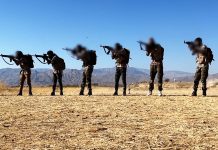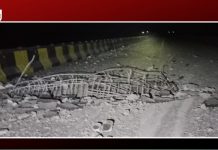On the 13th of August, a roadside IED (Improvised Explosive Devise) hit Frontier Corps’ (FC) convoy in Absar town of Kech district in Balochistan. As a result, multiple casualties were reported; however, the news did not end there.
After the 13th August’s attack, FC troops rushed to the nearby areas to carry out their routine search operation, which many deem as tactics of spreading fear among the masses. Pakistani troops barged into an orchard and got their hands on the first man they saw there. According to witnesses, he was beaten in front of his parents and tied up using the scarf of his own mother, dragged up to the road where he was extrajudicially killed by the FC personnel.
This young man later identified as Hayat Baloch’s picture shook the whole nation, blood-covered Hayat lying dead in front of his helpless parents. He was a final year student of BSc (Physiology) at Karachi University and was only at home due to the COVID-19 pandemic. During his stay at the village, he was working along with his parents to harvest dates, so he could contribute to the income of his poor family.
This murder would have remained another local story of terror where government forces pick up, torture and murder whoever they deem as an insurgent or their collaborator. It was only for the visual evidence and nationwide uproar which forced FC to hand over one of the murderers and used him as a scapegoat to cover all the previous “heinous crimes” this institute has committed.
Similarly, Saddam Baloch, an eighteen-year-old college student was killed by FC in Khuzdar on January 15, 2010. Under public pressure, a parliamentary commission was formed to investigate the murder but no one has ever heard about the outcomes of the commission whose members even visited the city to investigate the murder.
Quetta, Kharot Abad’s heart-wrenching incident in 2011, is another example of the reckless behavior of government forces in Balochistan where unarmed Chechen immigrants, including a pregnant woman, were brutally murdered by the same Frontier Corps’ personnel. No one was punished for it, however, to bury the case once for all, the forensic expert of the incident Dr. Baqir Shah was gunned down by unknown men.
Hayat’s murderer was handed over to the police because of active reporting by the local news outlets who provided all the evidence to the public which made it impossible to call this murder an accident or cross firing incident anymore. They now call it a transgression of authority by individual personnel.
When visual pieces of evidence fail to reach the media, it looks like peace has prevailed and pain has lessened for the people but it is not. The day Hayat Baloch was killed; the very day Pakistani military commenced a ground and aerial operation in Gichk area of Panjgur district. According to local sources, more than fifty men, women, and children were taken to undisclosed locations by the forces. We will not see this in Pakistan’s mainstream media.
Talking about transgression, it is actually the result of decades of impunity provided to government soldiers who literally hold the license to kill and no one can question them. The kill and dump policy by the military regime in Balochistan is not any different from killing an innocent student in front of his parents. Many innocent students have been picked up after such attacks and later, those people have turned up as dead bodies on the roadsides. The culprits have remained immune from any justice system.
People in Balochistan understand this colonial mindset of government forces, for which resources of a land matter more than the people of the land. Knowing this bitter truth, student organizations have launched a campaign against Frontier Corps’ presence in Balochistan demanding the complete evacuation of FC troops from cities. Chief of ‘Balochistan National Party’, Akhtar Mengal, has also called for an end to the mindset and impunity provided to the government forces.






























